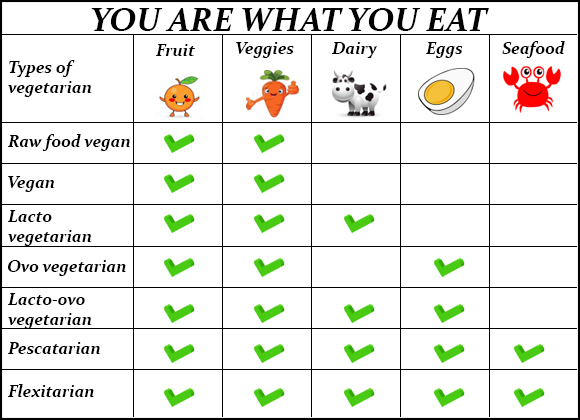shop categories
FREE SHIPPING with any purchase.
Vegan VS Vegetarian, which one is you?

Just like organic and natural, many people often get confused between vegan and vegetarian (including myself a few months ago). Whether it is for ethical, health, environmental reasons or just simply for pleasure, it is important to know the difference between vegan and vegetarian.
Differences Between Vegan and Vegetarian
Vegetarian:
1. Avoid meat, poultry, and seafood.
2. Some vegetarians may consume animal products like dairy and eggs, some don’t.
Vegans:
1. Avoid meat, poultry, and seafood.
2. Avoid foods produced using animals or animal products in any way, including honey, dairy, and eggs.
3. Many vegans also avoid clothing (leather, wool, and silk), cosmetic products, household items or other items made from animal products.
4. Some vegans may avoid products that are tested on animals.
Different Types of Vegetarian Diets
Actually, veganism is actually a sub-category of vegetarian diets. The most common types of vegetarians are vegan, lactovegetarian, lacto-ovo vegetarians, and ovo vegetarian. Here is a comparison of the three and other diets:

Benefits of Vegetarian Diets
1. High in Antioxidants and Vitamins
Diets that are high in vegetables, fruit and other plant foods like legumes or ancient grains provide antioxidants which can help to stop the progression of disease and help anti aging, and some essential vitamins, such as vitamin C, E and A.

Photo source:[3]
2. May Reduce Incidence of Diabetes
According to George Washington University School of Medicine, the high-fiber diet diets offer an important benefit for the management of diabetes and can even reduce the likelihood of development by one half.

Photo source:[4]
3. May Good for Heart Healths
Plant-based foods are good to lower inflammation which is the root cause of heart disease. Research has shown that there is often a link between eating a high-fiber diet and having increased protection against high cholesterol and heart disease.

Photo source:[5]
4. May Help with Weight Loss
People that consume a lot of vegetables and fruit daily do not easily gain weight. As Plant foods are low in calories. They are filling and keep you from over-eating. Mostly plant-based diets can lower the risk of obesity, and reduced complications related to obesity, such as heart problems.

Photo source:[6]
5. May Helpful for the Environment
By going vegetarian, we can reduce the impact of climate change, rainforest destruction, and pollution, while saving water and other resources.

Photo source:[7]

Related Products
follow
@signaturemarket
- Signature Market
- All Products
- New Products
- Items on Sale
- Stock Clearance
- Best Sellers
- Bulk Packs
- Bundles & Gift Sets
- Merchandise
- Breakfast
- Functional Beverages
- Coffee, Tea & Beverages
- Mueslis
- Granolas & Cereals
- Nut & Fruit Spreads
- Nuts
- Nuts & Trail Mixes
- Raw Nuts & Seeds
- Nut Bars & Bites
- Seasoned Nuts & Beans
- Food
- Organic Seeds & Beans
- Instant Meals
- Spices & Ingredients
- Health
- Wellness
- Sports Supplements
- Honey & Vinegar
- Snacks
- Dried Fruits
- Cookies
- Crackers
- Fruit & Vege Snacks
- Potato Chips
- Savoury Chips & Crisps
- Malaysian Favourites
- Popcorns
- Chocolates
- Jellies & Candies
- Yī (TCM)
- Herbal Soups
- Herbal Desserts & Teas
- Herbal Premier Selection
- Plant Origins
- Bundles & Gift Sets
- Bulk Pack
- Essential Oils
- Diffusers & Accessories
- Room Sprays
- Personal Care
- Skincare
- Care Plus
- Bunny-U
- Wholesome Meals
- Kiddy Treats
- Bundles & Merchandise
- Two Tails
- Pet Treats
 Same Day
Same Day- Beverages & Desserts
- SlimJoy Smoothies
- SlimJoy Shakes & Desserts
- SlimJoy Cut Fruits






















